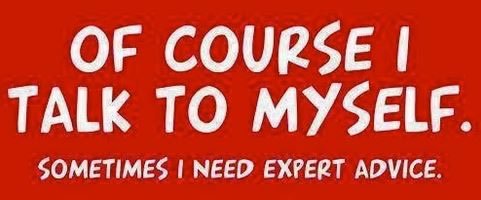Do you talk to yourself? Einstein used to. Research reveals that it makes your brain more efficient.

Babies learn to speak by mimicking what they hear. In other words, to learn how to use our voices we needed to practice using them.
Kids talk to themselves all the time. It’s only natural, because it helps them learn, retain focus and master tasks. Live Science reports:
"past research has shown that self-directed speech can help guide children's behavior, with kids often taking themselves step-by-step through tasks such as tying their shoelaces, as if reminding themselves to focus on the job at hand."
Adult Self-Talk

A well-known character by the name of Albert Einstein "used to repeat his sentences to himself softly". (Reported by Einstein.org)
Adults tend to look insane when they converse with themselves, right? Maybe, but there are positive uses...
Have a difficult decision to make? Debate both sides of the story. Hearing the options out loud and then elaborating on the pros and cons can help bring the best choice to light. An unexpected solution may surface.

Need to have an uncomfortable conversation? Rehearse it. Practicing what you need to say in order to get your points across clearly and calmly will strengthen your position.
Get a better understanding of your thoughts. Ever cried when you didn’t think anything was wrong? That’s your subconscious letting you know you’re not in touch with your thoughts. Reach new levels of self-awareness by inviting your subconscious to join your chat.
Had a bad day? Blow off some steam. Talk to yourself about the person or situation that’s bothering you. It may just help.

Work through stress and anxiety with a monologue. You don’t know what you’ll find.
Not getting appreciated at the moment? Compliment yourself on the handling of that difficult situation, the way you left your comfort zone or just got through a busy day.
Well directed mental messages (both out loud and in the mind) can enhance your attention span allowing for better concentration despite distractions. It’s essential for learning, performing better in life and helping to regulate decision making.
It’s normal to see athletes muttering under their breath before the big event. They’re preparing and priming themselves. They self-talk works.
What Researchers Say About Self-Talk
According to researchers most people talk to themselves at least every few days, and many report doing so on an hourly basis.
Cognitive psychologists Daniel Swigley and Gary Lupya conducted two experiments based on their own self-talk (their findings were published in the Quarterly Journal of Experimental Psychology).

For one experiment 20 pictures of various objects were shown to volunteers. The participants were asked to search for a particular picture, such as a banana, or apple. In half the trails participants were told to repeatedly say what they were searching for. In the other half they were told to remain silent. On average it was found that self-directed speech helped people find the right picture 50 to 100 milliseconds faster (the average overall time ranged from 1.2 to 2 seconds).
Gary Lupya reported:
"The general take-home point is that language is not just a system of communication, but I'm arguing it can augment perception, augment thinking."
Talking to yourself out load tends to increase alertness and solidify the end goal.

In a virtual shopping task experiment volunteers were shown photos of common supermarket items like Coke. They were asked to find them as quickly as possible. The results were more complicated than the first study, but evidence suggests that speaking the name of the item out loud only works if the participant is familiar with its appearance.
Gary Lupya stated:
"Speaking to yourself isn't always helpful — if you don't really know what an object looks like, saying its name can have no effect or actually slow you down. If, on the other hand, you know that bananas are yellow and have a particular shape, by saying banana, you're activating these visual properties in the brain to help you find them."
And Psychologist Linda Sapadin says talking to yourself can make you feel less lonely and smarter:
"Talking with yourself not only relieves the loneliness, it may also make you smarter. It helps you clarify your thoughts, tend to what’s important and firm up any decisions you’re contemplating. There’s just one proviso: You become smarter only if you speak respectfully to yourself."
Research also suggests you’re more likely to remember where you’ve put something if you speak the location out loud when placing the item. A potential tip for not losing your keys or wallet.
Talking Yourself to More Success

Generally the better you talk to someone, the better they respond. The same applies in any form of self-talk.
Berate yourself and you’re going to feel worse. If the dialogue is positive it’ll help clarify thoughts and get better results in what you’re trying to accomplish, even put you in a better mood.
By talking yourself through your goals each step becomes less difficult and more doable. You enjoy more focus, can screen out distractions better and achieve your goal faster.
Talking out loud is a powerful way to communicate with your subconscious so we should make use of it sometimes.
Choose your words wisely. Kids do:
Thanks for sharing. I would like to include it in my TOP5 Lucky Find Psychology articles for today! :)
Great... please do :)
Here is a post where I'm featuring your article:
https://steemit.com/psychology/@aleksandraz/daily-psychology-it-s-a-lucky-find-8-today-s-top-5
This post has been linked to from another place on Steem.
About linkback_bot